Feeling lost or unfulfilled? Check out this list of spiritual activities – designed to nourish everyone’s soul, regardless of their background or beliefs!
Have you ever felt a yearning for something deeper in life – a sense of connection beyond the daily? Spiritual exploration is a quest open to everyone, no matter what faith they profess (even if they do not have any particular one). Below, we will unveil a list of spiritual activities you can incorporate into your daily life (along with specific examples) to ignite your spirit and illuminate the path toward a more fulfilling existence!
Highlights
- This article explores various ways to connect with spirituality throughout life – with activities tailored to different age groups, from children to seniors, and even options for couples and group activities.
- Beyond age, we will also go over self-care and creative practices that contribute to nurturing one’s spirit, as well as activities specific to certain faiths.
- To wrap it up, the article addresses frequently asked questions about the benefits of spiritual practices, how to cultivate spiritual well-being, finding the right approach for you, and a few recommended resources to support your personal pilgrimage.
Spiritual Activities by Age
For kids
Nurturing a sense of wonder is key to a child’s spiritual development. This section explores engaging activities to spark curiosity and connection in younger kids – as well as practices that encourage self-reflection and compassion for older ones.
- Storytelling: Storytelling is a powerful tool for imparting moral values and spiritual lessons to children – by engaging their imagination and helping them understand complex concepts in a relatable way. Gather children in a circle and take turns sharing tales from various cultural backgrounds that emphasize kindness, empathy, or courage. These could be from religious texts, folktales, or even personal anecdotes with a moral.
- Gratitude jars: Gratitude jars provide a tangible way for children to express appreciation for the good things in their lives. It teaches them to focus on the positive and cultivate a mindset of thankfulness. Set up a crafting station where children may decorate their own jars with stickers, paint, or markers. Encourage them to write or draw things they’re grateful for on small pieces of paper and place them in the jar regularly.
- Simple service projects: Engaging in service projects instills a sense of responsibility and empathy in kids by showing them their potential impact on others’ lives. You can organize a neighborhood cleanup day where children pick up litter, plant flowers, or paint benches in a local park. Alternatively, they could prepare care packages for the homeless or visit a nursing home to spend time with elderly residents.
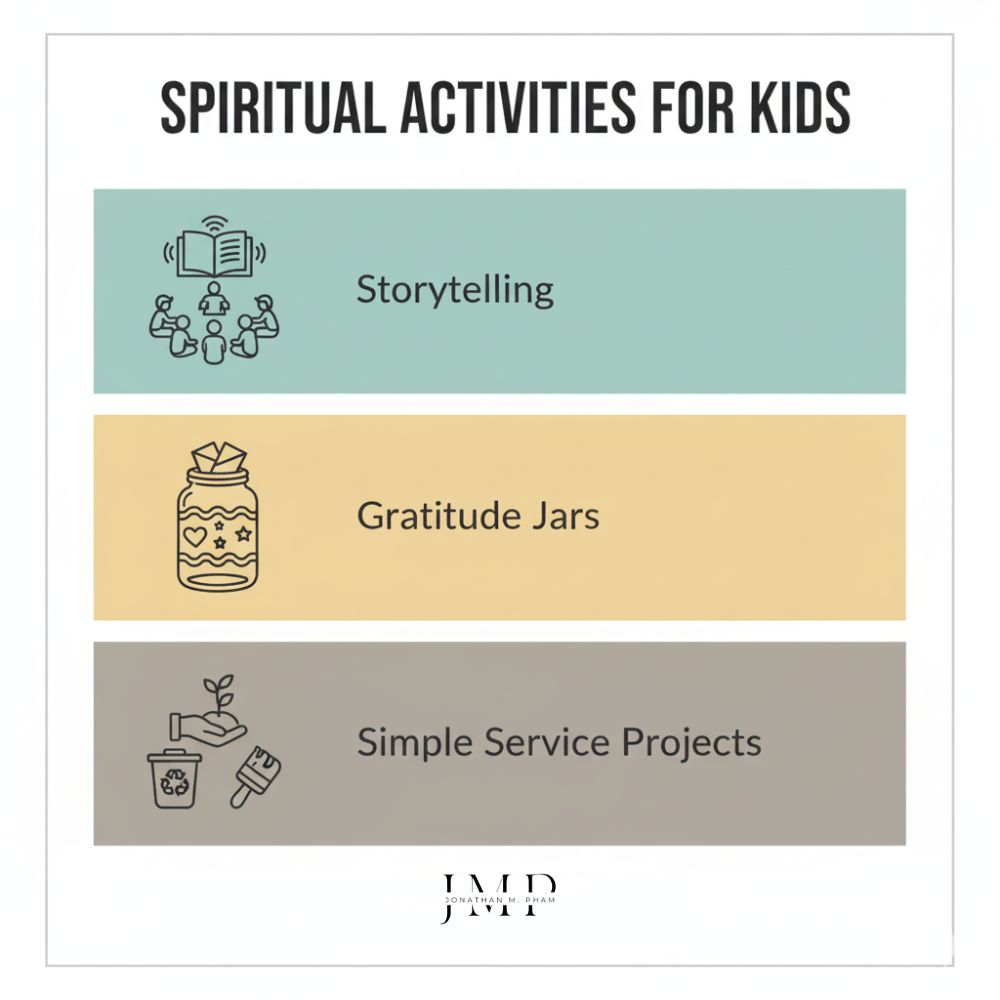
For youth & students
As teenagers and young adults navigate complex identities, spiritual exploration becomes crucial to defining who they will eventually become. Here, let us discover activities that resonate with their evolving needs, from fostering inner peace through meditation to seeking meaning through volunteering.
- Group discussions: Group discussions provide an avenue for youth and students to explore spiritual texts, themes, and questions in a supportive and open environment – thereby encouraging critical thinking, empathy, and deep reflection. Depending on the context, consider creating a book club or discussion group where participants read and discuss spiritual texts from various traditions, such as the Bhagavad Gita, the Bible, the Quran, or philosophical works like Thoreau’s Walden or Rumi’s poetry. Alternatively, contemporary topics like environmental stewardship, social justice, or mindfulness can also be selected for discussion.
- Volunteer work: Engaging in volunteer work allows youth and students to put their values into action, foster empathy, and understand the joy of giving back to the community. Aside from volunteering at local soup kitchens, homeless shelters, or animal shelters, they may also participate in environmental conservation projects, community cleanups, or fundraising events for charitable organizations.
- Coaching/mentorship programs: A good idea is to establish programs where older students or adults coach/ mentor younger peers in areas such as academics, career exploration, personal development, and spiritual growth. They can then offer guidance, share experiences, and serve as positive role models.
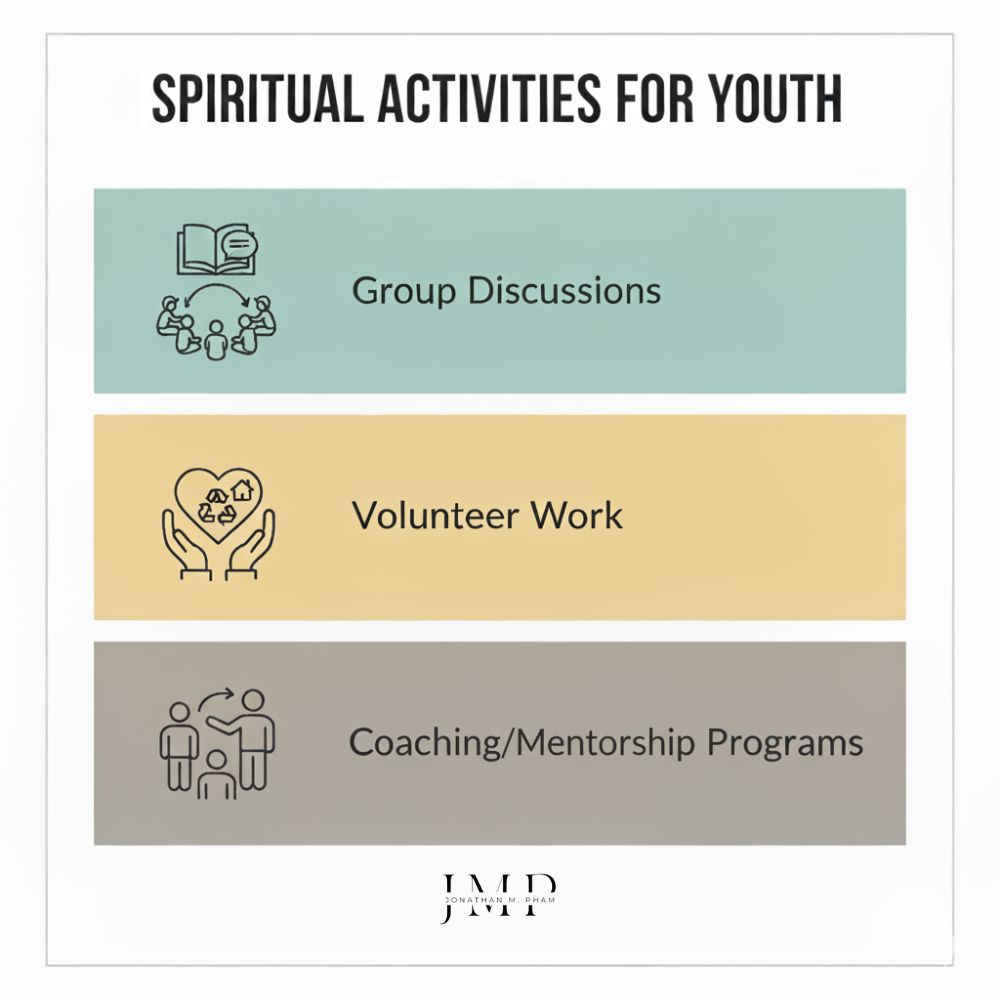
For seniors
With a lifetime of experiences, seniors often seek a deeper connection to their inner wisdom and values. This section explores practices like spending time in nature and reflecting through journaling, offering opportunities for continued spiritual growth and personal fulfillment.

- Music & art therapy: Music and art offer avenues for creative expression, emotional release, and mental stimulation. These therapeutic modalities have been proven in terms of their ability to improve mood, reduce stress, and enhance overall well-being.
- Nature retreats: Immersing oneself in nature provides opportunities to connect with the natural world, rejuvenate their spirits, and enjoy physical activity in a serene environment. Consider organizing day trips or weekend retreats to parks, botanical gardens, or nature reserves to engage in activities like birdwatching, nature walks, or picnics.
- Pilgrimage: Pilgrimage involves journeying to a sacred or holy site as an act of devotion, spiritual renewal, or seeking enlightenment. Such a trip is a great opportunity for reflection, prayer, and connection with one’s faith traditions.

For couples
Sharing their journey is a great way to strengthen a couple’s bond. This section delves into activities that cultivate connection, from practicing gratitude together to engaging in creative endeavors with a spiritual focus.
- Mindful communication: Practices such as deep listening, empathy, and sharing without judgment foster understanding, emotional intimacy, and connection. Couples should set aside dedicated time for open and honest conversations where partners take turns speaking and actively listening without interruption. Use ‘I’ statements to express feelings, thoughts, and needs, and practice reflective listening by paraphrasing what the other person has said.
- Joint meditation: Set up a comfortable space at home where partners can sit facing each other or side by side. Choose a meditation technique, such as focused breathing, loving-kindness meditation, or guided visualization, and practice together for a designated period of time.
- Gratitude exchange: By sharing daily what one is thankful about the other, partners may foster appreciation, positivity, and emotional connection between them. Such an activity can be done either during breakfast or before bedtime – with the two taking turns sharing specific things they appreciate or admire about their partner, whether it’s a small gesture, a personality trait, or an act of kindness.
- Spiritual trips: Plan a getaway to a retreat center, monastery, or natural sanctuary known for its spiritual ambiance and activities. Alternatively, embark on a pilgrimage to sacred sites or historical landmarks associated with the couple’s faith tradition, or interests.

For groups
Spiritual growth often flourishes when shared with others. Here, we’ll explore ways to connect with friends, family, or communities through group activities that foster a sense of belonging and shared purpose.
- Reading & religious study groups: Reading and religious study groups provide a platform for communal learning, discussion, and fulfillment through the exploration of spiritual or religious texts. Regular gatherings may be organized for members to reflect on and discuss passages from sacred texts, theological writings, or philosophical works. Encourage open dialogue, critical thinking, and the sharing of personal insights and experiences related to the texts.
- Meditation & prayer circle: Gather in a circle to engage in guided meditation, silent meditation, or group prayer, focusing on themes of peace, gratitude, or compassion. Create a ritual or structure for the circle, such as passing a talking stick for reflections or incorporating chanting or sacred music.

- Chanting or Kirtan group: Through the repetition of sacred mantras, devotional songs, or chants, group members may together enjoy uplifting and unifying experiences.
- Mindfulness cooking collective: Organize cooking workshops or potluck gatherings where group members come together to prepare and share meals mindfully. Emphasize the importance of being present, attentive, and grateful throughout the process, from selecting ingredients to savoring the final dishes.
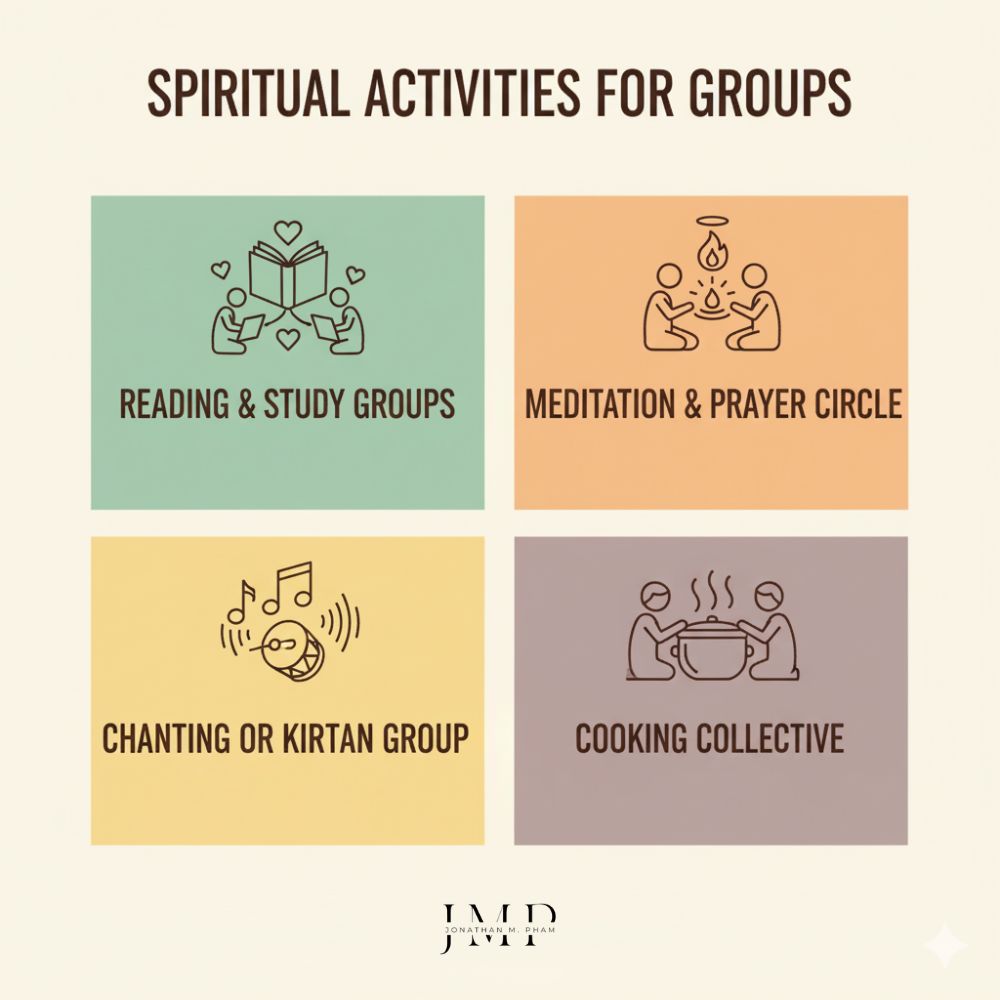
Social spiritual activities
Self-care Spiritual Activities
Sometimes, the most spiritual act is caring for ourselves. This section explores wellness practices like meditation and breathing exercises, along with nature walks and gratitude exercises, to help reconnect with your inner self.
- Mindfulness: Mindfulness practice involves cultivating present-moment awareness and inner peace through focused attention on thoughts, feelings, and sensations. If possible, one should set aside dedicated time each day for meditation, breathwork, or body scans. Engage in activities mindfully, such as eating, walking, or listening to music, by bringing full awareness to each moment without judgment.
- Gardening: Gardening offers a way to connect with the natural world, cultivate mindfulness, and experience the beauty of growth and renewal. It is recommended that one try to engage all of their senses by noticing the colors, textures, scents, and sounds of the garden as they cater to their plants.
- Journaling: By reflecting on thoughts, emotions, and experiences through writing, one has a much better chance of clarifying their values, gaining insights, and fostering self-awareness. There are a lot of spiritual journaling ideas to choose from – gratitude, aspirations, and challenges, to name a few. Consider using prompts or questions to guide your reflections and uncover your deepest thoughts/ feelings.
- Personal reflection: Find a quiet and comfortable space where you can sit or lie down without distractions. Close your eyes and focus on your breath, allowing thoughts and sensations to arise and pass without attachment. Use this time for self-inquiry, exploring questions of meaning and purpose.
- Reading inspirational quotes: Inspirational quotes, especially those concerning themes like faith and spirituality, may turn out to be amazing sources of insights, inspiration, and encouragement on your life journey. If possible, set aside time each day to read a selection of words from spiritual leaders, philosophers, poets, or religious texts. Reflect on the meaning and relevance of each quote to your life and beliefs.
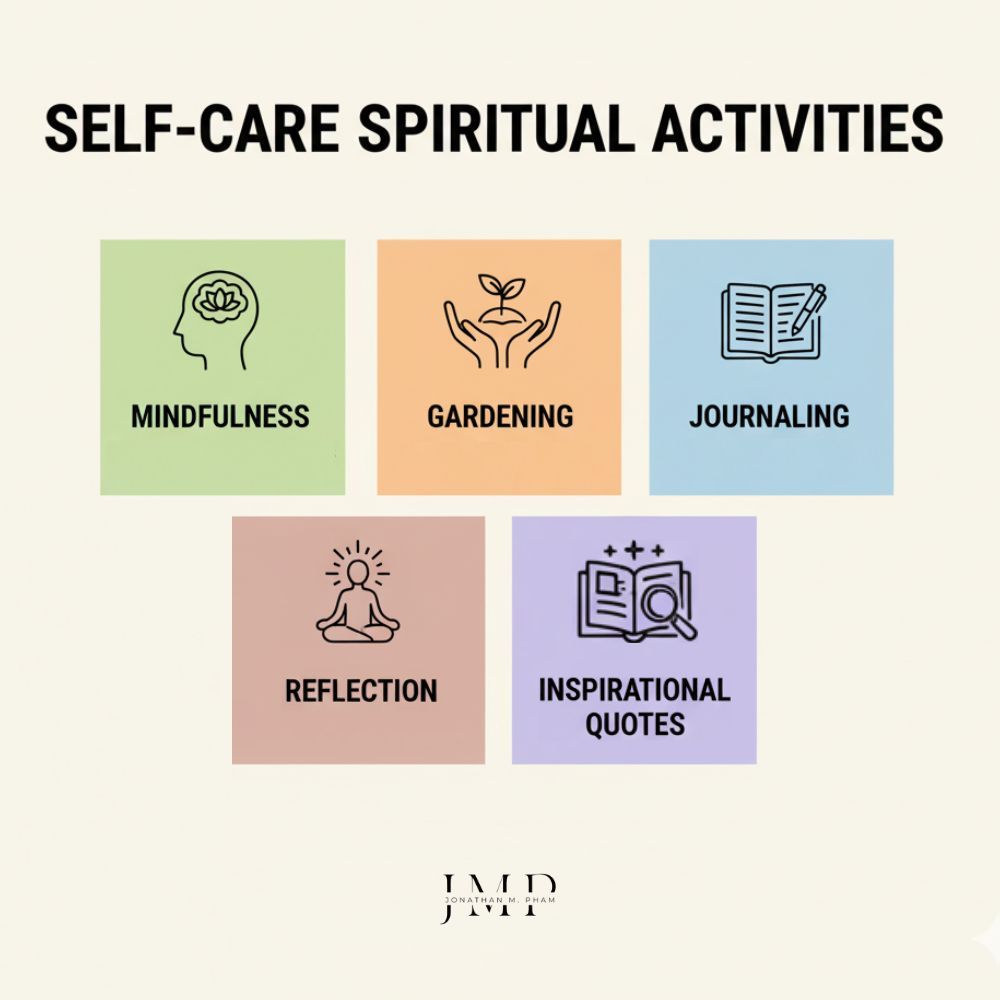
Spiritual self-care ideas
Read more: 200 Self-reflection Questions – Toolkit for Life Pilgrims
Creative Spiritual Activities
Creativity unlocks powerful avenues for spiritual expression. Below, you will find artistic outlets to help connect with your spirituality in a unique and fulfilling way.
- Spiritual gardening: This practice involves cultivating plants with intention, mindfulness, and a connection to the natural world. You can choose specific plants, flowers, or herbs that hold spiritual significance or symbolism to you, such as roses for love, lavender for peace, or sage for purification. Plant and tend to your garden with mindfulness, focusing on the intention behind each action and observing the cycles of growth and renewal.
- Music/dance with a spiritual focus: Music offers a powerful way to connect with the divine, cultivate joy, and experience transcendence through movement and sound. You can explore different genres and styles that resonate with your spiritual beliefs and practices, such as devotional chants, sacred music, or ecstatic dance.
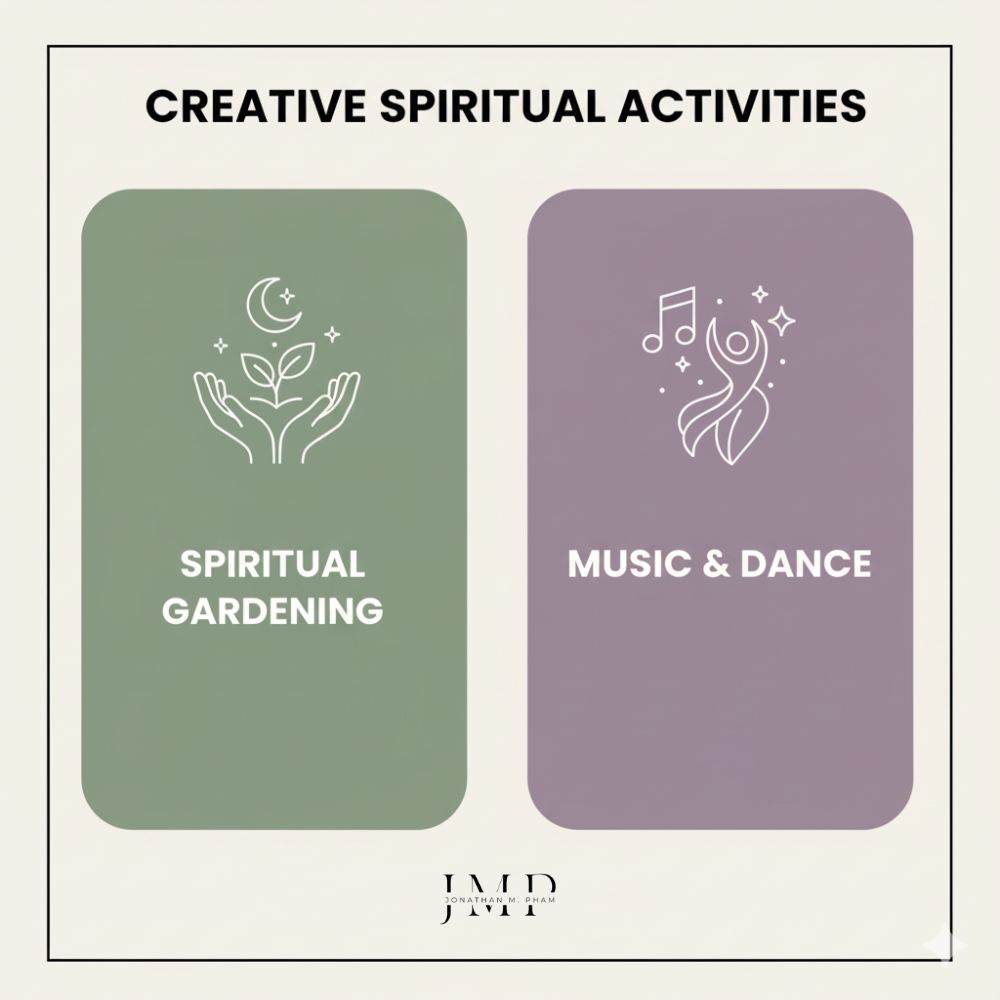
Fun spiritual activities
Faith-exclusive Spiritual Activities
Depending on the faith you proclaim, you may be able to find a few practices that resonate with you in the following section.
Abrahamic religions (Christianity, Judaism, Islam)
- Scripture study: Scripture study is about reading, reflecting on, and interpreting sacred texts such as the Bible, Torah, and Quran to deepen understanding of religious teachings, gain spiritual insights, and strengthen faith.
- Prayer: A fundamental practice in virtually any faith, praying is meant to facilitate communication with the divine through supplication, gratitude, praise, and intercession. Engage in daily prayers at specific times or intervals, following prescribed rituals, postures, and recitations as outlined in religious traditions.
- Fasting: Fasting involves abstaining from food and/or other activities for purposes such as self-discipline, purification, and drawing closer to the divine. Not only good for self-control, the practice also provides one with the time for reflection, prayer, repentance, and solidarity with the less fortunate.
- Worship services: Worship services are communal gatherings where believers come together for prayer, singing, scripture reading, preaching, and reflection – thereby fostering spiritual fellowship and collective worship of the divine.

Spiritual activities in churches/ synagogues/ mosques
Eastern religions (Hinduism, Buddhism, Taoism, etc.)
- Creating Mandalas: Mandalas are intricate geometric patterns used as meditative and spiritual art forms in Hinduism, Buddhism, and other Eastern traditions. Their creation typically involves repetitive and symmetrical designs, which are believed to facilitate concentration, mindfulness, and insight.
- Meditation: A core practice in Eastern religions (and has become widespread now – regardless of the faith), meditation is about calming the mind, cultivating awareness, and transcending ordinary consciousness to attain enlightenment.
- Contemplation: By reflecting deeply on spiritual teachings, concepts, or questions, one may gain insight, wisdom, and understanding of the nature of reality and the self.
- Yoga/Tai Chi: These are ancient practices that integrate physical postures, breathwork, and focus to promote physical health, mental clarity, and spiritual well-being. You can attend classes taught by experienced instructors or follow guided videos or books for home practice. Focus on the alignment of body, breath, and mind, moving with awareness and intention through each posture or movement.
- Puja/offering ceremonies: These are rituals in Hinduism, Buddhism, and other Eastern traditions where symbolic gifts, such as flowers, incense, food, and prayers, are presented to deities, ancestors, or spiritual beings as acts of devotion, gratitude, and reverence. They can be performed either at home or in temples, following traditional rituals and prayers specific to a religious tradition.
Indigenous traditions
- Sweat lodges/ Purification ceremonies: Taking part in a sweat lodge ceremony is a chance for participants to engage in prayer, song, and meditation to cleanse the body, mind, and spirit.
- Vision quests: A vision quest is a solitary journey into nature for self-discovery, spiritual guidance, and initiation into adulthood or a new stage of life. It typically requires spending several days alone in a secluded wilderness area, fasting, praying, and seeking vision or revelation from the natural world.
- Chanting/drumming: Gather in a circle with members of the community to chant sacred songs, hymns, or prayers accompanied by drumming, rattling, or other percussion instruments. Allow the rhythm and vibration of the music to carry you into a state of heightened awareness and communion with the divine.
- Communal rituals: These involve ceremonies, dances, and celebrations that honor the natural world, ancestral spirits, and community values and traditions (e.g. harvest festivals, coming-of-age ceremonies, or powwows).

FAQs
What are the benefits of engaging in spiritual activities?
Engaging in spiritual activities offers a wide range of benefits that touch on various aspects of life. Here are some of its key perks:
- Inner peace and stress reduction: Practices like meditation, prayer, or spending time in nature have been proven in terms of their ability to promote feelings of calm and relaxation, which act as a great buffer against the daily stresses of life.
- Greater meaning and purpose: In pondering over their spirituality, one is also prompted to explore questions about life’s purpose and their sense of direction – which is particularly helpful during challenging times. At the same time, it also fosters a better understanding of oneself and their values – a critical requirement for self-discovery and acceptance.
- Stronger sense of community: Many spiritual paths involve communities or groups that provide social connection and support for those yearning for a sense of belonging.
- Improved mental and physical health: Studies have shown that spirituality is linked to lower rates of depression, anxiety – and even better physical health. Some claim that this may be partially attributed to the stress-reducing effects and healthier lifestyle choices that often accompany such pursuits.
When it comes to spiritual activities, there is no right or wrong way to do them. Some people find fulfillment through organized religion, while others connect through meditation, spending time in nature, or acts of service. The key is to find practices that resonate with you and bring a sense of peace, purpose, and connection to your life.
Read more: Spiritual Purpose – The Quest for the Soul’s Calling

Spiritual retreat topics
How do I enhance spiritual wellness?
There are countless paths to enhancing your spiritual wellness, and they can all be tailored to your interests and lifestyle. Here are some ideas for you to get started:
Indoor:
- Meditation: Meditation comes in many forms. You can look up to a dedicated app for guidance – or simply sit quietly and focus on your breath. Even short periods should produce massive benefits.
- Yoga: Yoga combines physical postures, breathing exercises, and meditation to promote relaxation, improve flexibility, and enhance mindfulness.
- Reading spiritual texts: Explore religious texts, inspirational works, or books on philosophy. Find something that sparks your curiosity and offers new perspectives.
- Create art: Letting your creativity flow through painting, drawing, or any form of artistic expression is a deeply meditative and spiritually connecting experience.
- Gratitude: Keep a gratitude journal where you write down things you’re thankful for, or simply take a moment each day to reflect on what brings you joy.
- Self-reflection: Spend some time journaling, reflecting on your experiences, and exploring your values. Ask yourself questions like “What matters most to me?” or “What kind of person do I want to be?”
Outdoor:
- Spend time in nature: Immerse yourself in the sights, sounds, and smells of nature. Go for a walk in the park, hike in the woods, or simply sit outside and breathe the fresh air.
- Volunteer: Helping others is a powerful way to connect with your community and feel a sense of purpose. Find a cause you care about and give your time or resources.
- Listen to music: Uplifting or calming music can evoke emotions and connect you with something deeper.
- Practice mindful movement: Go for a walk, run, bike ride, or do some gentle stretches while focusing on your body’s movements and how they feel.
Read more: 50 Spiritual Questions for Awakening the Soul

What are some challenges to spiritual growth?
The path of spiritual growth is rarely linear; in fact, there are bound to be bumps along the way. Here are some common challenges one might encounter:
- Distractions and busyness: In our fast-paced world, it’s easy to get pulled in a million directions. Making time for spiritual practices often feels like a luxury we don’t have.
- Doubt and skepticism: It’s natural to question your beliefs or feel unsure about your spiritual path.
- Negative emotions: Struggles with anger, sadness, or fear all make it difficult to connect with your inner core.
- Lack of guidance: If you’re new to spiritual exploration, it is often overwhelming to know where to start or how to deepen your practice.
- Comparison: The tendency to compare our spiritual progress with those of others is extremely damaging. After all, spirituality is something personal and specific to each person.
In times when you feel stuck and not sure how to move forward, here are a few practical tips to get back on track:
- Revisit your foundation: Reflect on what initially drew you to spirituality in the beginning. What are your core values and beliefs? Reconnecting with these should greatly reignite your passion.
- Start small: Don’t overwhelm yourself by trying to overhaul your entire routine. Begin with small, manageable practices you can easily integrate into your day.
- Find a community: Surround yourself with people who share similar spiritual interests. Look for local groups, classes, or online communities that offer support and encouragement.
- Seek guidance: Consider talking to a spiritual leader, mentor, or therapist who can provide support and guidance on your journey.
Spiritual growth is a lifelong process. There will be ups and downs, moments of clarity, and periods of doubt. Trust the process and enjoy the exploration. Instead of comparing yourself to others or dwelling on past experiences, be present in the moment and focus on the practices that bring you peace and purpose right now.

How do I find a spiritual activity that works for me?
Here are some tips to guide you:
- Consider your interests: Reflect on what naturally brings you a sense of peace, joy, or wonder. Do you find solace in nature? Enjoy helping others? Appreciate music or art? These inclinations may serve as valuable clues to activities that might nourish your spirit.
- Explore different traditions: Learn about various religions, philosophies, or spiritual practices. Read books, listen to podcasts, or attend introductory classes. Look beyond labels and focus on aspects that resonate with your values.
- Experiment: Don’t be afraid to try new things! Take a meditation class, volunteer at a cause you care about, spend time in a religious service, or simply sit quietly in nature and reflect. See how each activity makes you feel.
- Pay attention to your intuition: As you explore different practices, notice how they affect you. Does something feel particularly calming, inspiring, or meaningful? Trust your gut feeling as a guide who will not fail you!
If you are interested, feel free to check out some examples of spiritual development goals you can set for yourself, tailored to different activity types:
Mindfulness & meditation goals:
- Increase daily meditation practice from 5 minutes to 10 minutes.
- Notice and acknowledge five things you’re grateful for each day.
- Take mindful walks in nature, focusing on your breath and surroundings.
Action-oriented goals:
- Volunteer at a local soup kitchen once a month.
- Practice random acts of kindness towards strangers.
- Dedicate time each week to helping a friend or family member in need.
Creative & reflective goals:
- Start a gratitude journal and write down three things you’re thankful for each day.
- Spend 15 minutes each morning journaling about your thoughts and feelings.
- Take an art class to explore creative expression as a form of spiritual connection.
Nature-based goals:
- Go for a walk in nature at least three times a week.
- Spend time gardening or caring for houseplants.
- Plan a camping trip or retreat in nature to disconnect and reconnect with yourself.
Read more: How to Find the Beauty in Everyday

Are there resources available to help me on my spiritual journey?
There are a vast amount of resources available to assist you on your spiritual journey. Here are some suggestions to consider that cover different areas of exploration:
- “Life Visioning” by Michael Beckwith: A guide to setting goals and creating a fulfilling life based on your core values.
- “Man’s Search for Meaning” by Viktor E. Frankl: A psychiatrist recounts his experiences in Nazi concentration camps and explores the importance of finding meaning in life.
- “The Power of Now” by Eckhart Tolle: A guide to present-moment awareness and spiritual awakening.
Websites:
- Spirituality & Practice offers a wealth of articles, podcasts, and online courses on a variety of spiritual topics.
- The On Being Project explores the intersection of spirituality, theology, science, and the arts through interviews with leading thinkers and spiritual leaders.
After all, it’s worth reminding that the most important resource is your own curiosity and willingness to explore. Be open to new experiences, trust your intuition, and enjoy the process!

Spiritual things to do
Final Thoughts
Embarking on a spiritual journey is a deeply personal experience, and the beauty lies in discovering what resonates most with you at the end of the path. By incorporating the spiritual activities mentioned above into your life, you may start having a taste of what it means to connect with something bigger than yourself – as well as the joy and abundance that comes with this realization. So, take a deep breath, open your mind, and let these practices guide you toward a life filled with greater purpose and peace!
Other resources you might be interested in:
- 18 Best Spiritual Films: Awaken, Inspire, and Enlighten
- Unconditional Love: Key to Spiritual Transcendence
- Healing Your Inner Child: A 15-step Guide
- 250 Bucket List Ideas for Living Your Best Life
- 32 Self Discovery Activities for Everyone
Let’s Tread the Path Together, Shall We?


